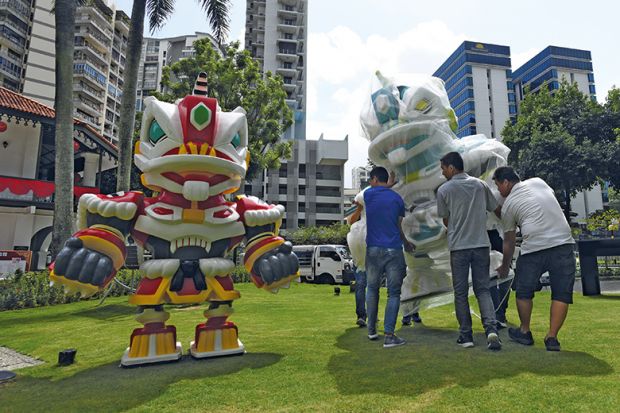A Singapore university is scrapping its use of personal statements in undergraduate admissions amid concerns about applicants’ growing use of ChatGPT.
Under new changes for this autumn’s entry, Singapore Management University (SMU) has abolished the essay used by applicants to explain their values, approach to learning and achievements beyond academia, and replaced it with shorter structured answers related to a potential student’s intended course.
The reforms are intended to reduce the use of ChatGPT and other generative artificial intelligence chatbots – some of which are expressly geared around creating personal statements – as the questions in the new format are “much easier for applicants to answer”, explained the university’s provost, Timothy Clark.
“There’s less of a temptation or need to go to AI for help,” said Professor Clark, a former pro vice-chancellor at Durham University. “In fact, it’s probably even faster for students to just come up with their own short response rather than having to think of the right prompt to input into ChatGPT in order for a plausibly useful response to be generated.”
Campus resource collection: AI transformers like ChatGPT are here, so what next?
However, the use of generative AI would not be banned when answering the new questions in the new format, said Professor Clark, who insisted that the university was “not against students using generative AI to spark ideas and for inspiration”.
“What we do want to see, however, is authenticity and a strong personal voice, which is hard to do with generative AI still in the early stages at this moment,” he said, adding that he hoped the answers would “provide a little glimpse into the applicant’s personality and potential fit for both the student and the university” ahead of an admissions interview.
SMU is one of the first universities to scrap the personal statement directly in response to the rise of artificial intelligence, although the UK’s admissions body, Ucas, is withdrawing the essay for 2025 entry onwards on the basis that the 4,000-character essay unfairly advantages middle-class students.
In the first admissions window since generative AI went mainstream last year, SMU’s clarification on how it will treat AI-generated admissions content remains unusual within higher education. Only a handful of US universities have publicly banned AI use by students in admissions, although Ucas currently advises that “generating…all or a large part of your personal statement from an AI tool such as ChatGPT, and presenting it as your own words, could be considered cheating by universities and colleges and could affect your chances of an offer”.
Conversely, university admissions teams are increasingly using AI to help select promising students despite concerns that algorithms might inadvertently discriminate against certain groups.
Reflecting on how SMU used AI, Professor Clark said an applicant’s academic performance was still the most important piece of data to assess “the applicant’s intellectual potential and readiness for university-level work”.
“This is the starting point for most selective universities around the world,” he said, adding that SMU also used individual and group interviews to gauge university readiness.
Register to continue
Why register?
- Registration is free and only takes a moment
- Once registered, you can read 3 articles a month
- Sign up for our newsletter
Subscribe
Or subscribe for unlimited access to:
- Unlimited access to news, views, insights & reviews
- Digital editions
- Digital access to THE’s university and college rankings analysis
Already registered or a current subscriber? Login








